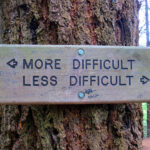When anger enters the mind, wisdom departs – Thomas à Kempis
What does that mean?
Anger. In moderation it can be somewhat useful as a motivator. But how rarely is it used in moderation? It seems to run past moderation rather quickly, on the path to excess far too often.
That is the warning of the quote. Once anger gets into your mind, it quickly pushes logic, reason, compassion, mercy and all forms of wisdom out. That’s just how it tends to work when you are angry.
Anger is a cruel and unforgiving mistress. It brooks no competition, no rivals, no alternatives. Everything else is pushed out after it arrives, or had already fled as anger enters.
The quote finishes by reminding us that for wisdom to remain, anger must not be given admittance to the mind. And I imagine we can agree that having a mind full of wisdom is more desirable than one filled with anger.
Why is avoiding anger important?
To remain with a mind centered on wisdom, avoiding anger is a necessity. By avoiding becoming angry, we allow our mind to remain free and us to think clearly. And that, to me, is an important thing. Very few people I know find anger more useful than wisdom, and they have also chosen to minimize the chance to become angry as best they possibly can.
Making decisions with anger instead of wisdom can lead to tragic results. When we are angry, our thoughts are clouded with that anger, and our possible solutions are narrowed to those which allow our angry thoughts to exert themselves and their power over those with whom we are angry. There are few scenarios where that ends well for anyone.
With anger, when directed outward and enacted, come dire consequences. Damage, injury or worse. From that come restitution, fines and even jail time. If anger is directed inward, it only gets worse. The inner dialog with yourself becomes one of hatred and rage, and can lead to self-injury, in physical, mental, emotional and spiritual forms. And at worst, it can lead to death.
Those are some of my reasons for attempting to avoid anger as much as possible. What are some of your reasons can you add for attempting to avoid becoming angry?
Where can I apply this in my life?
We’ve all had moments when we were angry. But have you ever considered what the results would be if the things we thought about were brought to fruition? What if your angry desire to bash in someone’s head, or to smash their face, break bones, or do other terrible things actually happened? How bad would that be if you actually acted those thoughts out?
Take a moment and think back to a time when you made a decision while you were angry. How long did it take to realize that wasn’t the best decision you could have made? How long did you regret having made that decision? And how many of those decisions, made in anger, do you still have reason to regret to this very day?
While thinking of such times, I presume you can understand the meaning of the quote. If we agree that anger can be a problem when making a decision, the question rather quickly becomes how to best limit the danger anger poses, and the damage it can do, to both you and to those around you.
Have you heard of the ‘count to ten’ method, where you take slow, deep breaths (ten, typically) and allow the anger a moment or two to fade before answering any question or responding to any insult. There is also the GateKeeper method, where you consider if the words are True, Kind, Helpful and Necessary. However both methods require at least some wisdom to remain despite the being angry.
There are plenty of other ways to deal with anger and harsh words. You probably have a few techniques which you use. But the question is how effective are they? How well do they help you keep your mouth shut at the right times? How well do they keep you from acting at the wrong time for all the wrong reasons?
So I ask you to consider how effective your attempts to manage your anger have been? What steps could you take to improve your reaction to situations which presently bring out anger in you? How can you do to help drive anger from your mind, so that wisdom can remain? Are you open to looking for other ways, other methods to help blunt anger before it becomes too powerful?
I would suggest you conduct some additional research on your own. You can start on my site and also dig around on your favorite search engine. What is important isn’t who said what, but the impact it has on you. If it works, don’t knock it, use it.
From: Twitter, @Zen_Moments
confirmed at : cited as being from his book “The Imitation of Christ”
photo by Robert McGoldrick








Interesting perspective.
Let me add this quote from the book “Our X Factor”:
“How anger works. We get confronted with an undesirable situation that stirs our emotions. This conjures uncomfortable feelings like fear, loss of control, indecisiveness, resentment or regret. We may feel that the situation in which we find ourselves distances us from our goals, adds to our plight, slows us down, burdens or stresses us, or that our goals themselves are jeopardized. The emotions get us worked up, and we get angry. Any aggravation, annoyance, irritation, or unexpected occurrence disturbing our routine can then trigger a reaction of anger. As a result, we lose focus (inability to see things for what they are) and perspective (inability to understand their effect in time and on other situations), and our minds shut down our peripheral thinking (inability to opt out, ignore, or search for alternatives).”
So, yes indeed, “When anger enters our minds, wisdom depart.”
Thanks for your post.
Xavier
Thanks for stopping by and for leaving such kind (as well as informative) words. I don’t usually let product comments stay, but this looks like a useful resource.